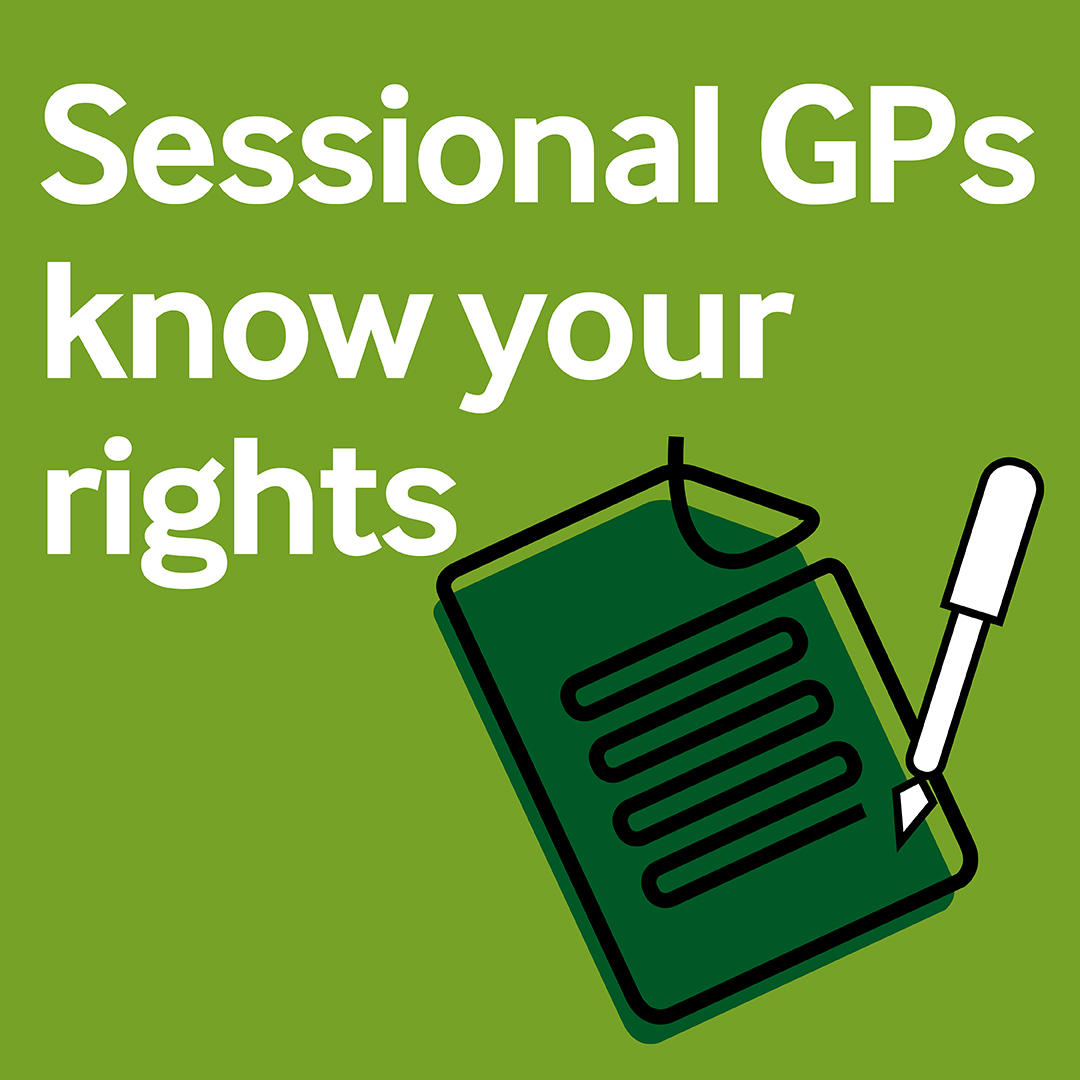
Find practical advice and resources to effectively approach your employer for manageable workloads and agreeing overtime rates.
Whether you are a locum GP, consultant, or an employer of locum services such as a GP practice, we have guidance and fees to help with your negotiations.
Our guidance for employers includes factors to consider when employing a locum.
Locums work within UK general practice in the following areas:
- Self-employed GMS practice Personal medical services
- (PMS) practice Private or non-NHS practice
- PCO-employed practice
- Out-of-hours providers
- Alternative primary medical services
- Employment through a locum agency
Advice for employers
What all locums must have
All doctors working in locum positions are required to have the same training and Postgraduate Medical Education and Training Board (PMETB) accreditation certificates as medical providers for whom they work.
All doctors must be included on one performer's list in the country in which they practise. Doctors can only be registered on one performer's list in each country. It is in the primary medical services provider's interest to support appropriately trained and qualified locums so that they are available to cover them for annual, maternity, sick leave or management time.
Who is responsible in cases of negligence?
Primary medical services providers are responsible for any negligent acts of locums providing cover for them, but only to the extent that these acts are related wholly to the services that are being provided, and not something that is outside the remit of what is expected of the locum in the ordinary course of providing those services.
Locums are required to practise under the GMC guidance Good Medical Practice. Primary medical services providers, therefore, have some responsibility to support locums engaged by them to maintain their professional skills.
For example it would be fully incumbent on the providers to maintain the appropriate insurance cover for the practice as a whole and that would include the negligence of locums providing contracted services to the practice.
Who may be involved in negotiations?
- Contractor
Any person or organisation entering into a contract to provide primary medical services. - Performer
A healthcare professional who assists with the provision of primary medical services under a GMS, PMS, alternative provider or primary care medical services arrangement, together with the equivalent arrangements under Scottish, Welsh and Northern Irish legislation where the terms differ. - Provider
A person or organisation who contracts to provide primary medical services with a primary care organisation under arrangements to provide general, personal, alternative provider, or primary care trust, medical services, and the equivalent arrangements in Scotland Wales and Northern Ireland.
What is a session?
An agreed period of time or agreed task of work, not usually exceeding four hours. A session should usually include adequate time for administrative work arising during clinical contacts in that time.
From 1 April 2004 all registered medical practitioners were required to be on a PCO's Medical Performers List. This aggregates previous lists (Medical List, Supplementary List and PMS List). A performer provider is a performer who has a contract with a PCO to provide primary medical services within the area.
How to ensure a high quality locum service
The fee must take into account all duties performed by the covering doctor during the session.
Allow reasonable appointment times for consultations and time for the completion of paperwork, such as referral letters and requests for medical tests. Remember self-employed locums have to bear similar professional costs of practice as other GPs, including professional indemnity, General Medical Council (GMC), BMA, NASGP and Royal College of General Practitioners (RCGP) subscriptions.
Each session length and content has to be negotiated and agreed with a realistic assessment of work to be undertaken. Any additional administrative workload incurred is negotiable with the contracting organisation.
Identify what other GPs earn
Primary medical services providers who are also GPs provide a benchmark against which GPs' incomes may be compared. This may take into account the average superannuable income of GP providers and the figures published by the Doctors and Dentists Review Body (DDRB) for salaried GPs.
Consider the medical experience and skills held by the locum
Postgraduate qualifications, background skills (eg familiarity with local healthcare systems), knowledge of the local geography of the practice area, as well as the actual contracting practice itself, may all add to a locum's increased value.
Local training in primary and secondary care and experience in general practice (including experience as a principal) will also add to the skills of a doctor to a practice; clinical experience may well prove more applicable than previous management skills. Experience increases with the length of service as a GP. This cumulative experience may be reflected in the rates charged.
Working environment
A locum will sometimes be engaged in a working environment in which they are unfamiliar therefore previous experience of working in these situations is therefore highly valuable and may be reflected in the fees set. When discussing and negotiating a level of payment for the session of work required, both parties should consider the type and intensity of the work and ensure that this is reflected in the level of the fee.
Also consider the impact of the following in making an assessment of the work environment:
- large volumes of high workload patients, eg patients in nursing homes, the homeless, asylum seekers, those with drug misuse problems etc
- familiarity with practice procedures, eg ordering investigations, referring patients to secondary care
- familiarity with practice equipment, eg computer systems
- availability of practice partners for advice, support etc
- the type of session, eg open access, booked appointments, enhanced service provision
- practice staff support, eg availability of practice nurses
- and any other factors that could have an influence on the degree of intensity experienced within a worked session.
Job security
By being self-employed, locums have taken the risk that if they fall ill, take time off for family reasons, take any form of holiday or study leave, or have unfilled sessions, they will not get paid.
Getting paid on time
Are you a GP locum working in England, Wales and Northern Ireland?
You are required to pay your pension contributions to your Area Team or Local Health Board within 10 weeks of completing any locum work. If payments are made outside of this period the Area Team or Local Health Board is able to decline the payment and you will not be able to pension the period of work in question.
How to get paid within the 10 week time limit
- Agree how and when you're paid in writing
The locum agreement should include details of the time period within which your fee should be paid. As the pension payment has to be made by the 7th day of the following month, it is best to state your expectation of being paid by the last day of the month worked.
See the locum agreement guidance - Remember to create an invoice to give to the practice well in advance of the last worked day that month (without this you are unlikely to be paid).
It is a good idea to use a standard invoice template. The invoice should also include details of the time period within which your fee should be paid.
It is important that invoices clearly show the rate and amount of the employer's contribution as a separate charge; in England and Wales this is 14.3% and in Northern Ireland this is 16.3%. The rate is charged on 90% of the total locum fee. This is the pensionable part of the fee, as 10% is regarded as being used to cover expenses.
Download the BMA's pro forma invoice - Get the 'GP Locum Form A' signed before you leave the practice
This will allow you to forward the payment to your Area Team or Local Health Board (along with the relevant month's Form B and your employee's (plus employer's in E&W) contribution). Although, please note that your cheque may clear before you have been paid by the practice.
Make copies of your forms A and B and retain for your records. - Invoice early
If you have booked the session with the practice directly, consider handing your invoice to the practice manager before you leave or send via email the same day.
If you have booked the session with a Locum Agency, it is a good idea to send the invoice via email to the consultant who booked you and the finance officer immediately after the work, requesting payment within a specified number of days. If not paid within this time, call the finance officer for clarification.
Some locums choose to invoice for payment at the end of each month. Either way, you should complete the forms in good time so that you can submit them, and the contributions by the 7th day of the following month. - Keep accurate records
In addition to recording all sessions worked, it is a good idea to make a note in your diary or calendar of the date you send the practice the invoice. Set a reminder to chase if payment is not received within a certain time, for example, 2-4 weeks.
You may wish to consider purchasing commercial software which can be hugely valuable for locum diary function, generating automatic invoices and forms A and B recording payments and finances. - Find out how the practice normally processes their payments
Some practices pay their locums via cheque. Others have to receive invoices by a particular date especially if they use electronic payments. It is very useful to know if this is the case because if you miss the date, you often have to wait until the following month for payment. Joining a local sessional GP group helps to share knowledge of local practices. - Try different methods of chasing
If payment is not received, call the practice manager (a phone call is sometimes much more effective than an email). A call can be followed up with an email formally requesting payment again so that you have a record. Ask them to confirm receipt by reply or set to receive a "read receipt" when you send your email. - Submit your forms and the contributions early, if possible
Ask for a receipt of your pension contributions from your Area Team or Local Health Board each month. This can be done including a tear off slip at the bottom of your letter with all your details, the amount you have sent and the date so all they need to do is sign and stamp it. Enclose a stamped addressed envelope for them to send back to you. - Late payment
Under late payment legislation, you would have the right to charge interest on an overdue account. It may also be worth contacting your LMC who may be able to help. - Reconsider your options
If a practice is not reliable at paying on time reconsider whether you wish to work there again. Or consider increasing your fee to compensate for the fact you may not be able to pension work for this practice. Please note this may not be suitable if you are close to retirement or looking to maximise your NHS contributions.

